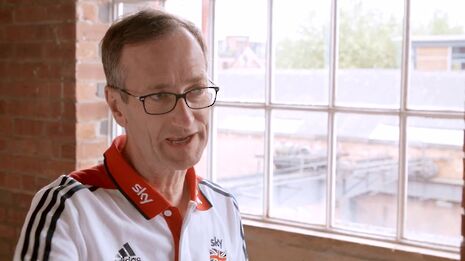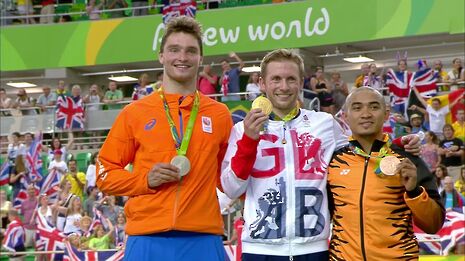Professor Tony Purnell: ‘It’s stone-bonking obvious that technology has a major part to play’
Paul Hyland is introduced to the high-octane world of sports engineering with the visiting fellow at Trinity Hall

Despite all evidence to the contrary, Professor Tony Purnell would like to make one thing perfectly clear: “I’m not an academic!”
A visiting fellow at Trinity Hall, with Engineering degrees from Cambridge and MIT (“like having an unbelievable credit card to open doors”, in his words), Purnell is rather more a businessman whose career has never strayed very far from the world of sport. Scarcely having finished a PhD on the dynamics of Formula 1 cars, he was inventing revolutionary new ways to collect data on drivers’ performances, which led to the setting up of his own business: Pi Research.
“We became the Microsoft of motor racing”, he says. “All of the electronics in the cars came from Pi.” Twelve years in, Ford liked it so much they bought the company, making Purnell the head of the Jaguar Formula 1 team in 2002. “Except it coincided with Ford going into free-fall as a business”, he explains. “They narrowly avoided going bust. In 2005 I sold the business to Red Bull. We didn’t get on with Red Bull at all. At the time they were a marketing company; they didn’t have the first clue how to run a Formula 1 team.”
Purnell was removed from his position within months, a decision Red Bull lived to regret when the quality of the car he and his team had created became obvious. A stint working alongside Max Mosley at the International Automobile Federation (FIA) was followed in 2013 by an invitation to become head of British Cycling’s famous ‘Secret Squirrel Club’ – a team of engineers whose job it is to help their riders to make the marginal gains that, altogether, give them a serious head start on the track.
“You can be cynical about it and say that the Brits win because they spend more money – well, correct!”
Professor Tony Purnell
The mere mention of cycling sparks the fondest of memories. “Working with the Olympic team at Rio was phenomenal. I took a selfie the last second we were in the Velodrome. It was a bit melancholy because I thought, ‘I’m never going to have a week like this again.’ As a student I loved May Week. I thought it was fantastic – you work so hard coming up to May Week, then suddenly there’s no work. Rio was a bit like that. It was such hard work, it was like the stuff of nervous breakdowns. Everything went wrong, but we just got everything done in time. Then they [the cyclists] got to Rio and they just smashed it. So the misery made it even better. If it had been smooth I don’t think it would have been as good.
“Do you remember the Tour de France in Cambridge?” he asks, rhetorically. “The number of people who turned up was amazing. It creates aspiration. I think the psychologists would tell you that what motivates people more than anything is aspiration. And fairly ordinary people going to the Olympics and coming back with medals has a big effect on youngsters.”

It could hardly have been a better Olympics for increasing aspirations. Team GB brought home six gold medals in cycling – three times as many as their nearest competitors, the Netherlands. But cycling is one of UK Sport’s most heavily invested events. Twelve medals at the London Olympics lifted British Cycling’s funding from £26 million to £30.2 million for the Rio Olympics. The correlation between investment and return is quite stark.
“You can be cynical about it and say that the Brits win because they spend more money – well, correct!” I wasn’t expecting him to be quite this candid. “It works. We have 1,300 professional athletes paid for by the government. If you say to a promising youngster, ‘We’ll give you a salary, we’ll give you coaches, we’ll give you physiotherapy all so you can pursue your sport’, and you pit them against the French who turn up at the weekends, who’s going to do better?” He laughs.
But is it right that the Brits get to do better?
“The truth of it is that it’s not ‘fair’”, he begins. “The fact that our athletes get paid to train for four years – how can that be fair? But I’m afraid life isn’t fair. If you stagnate it by putting everyone on identical equipment, it alienates the public”. He reaches for an example from his other area of expertise: “In the Indianapolis 500, they made the decision to give everybody the same car, and it was all a level playing field. The public interest since that decision has sagged and sagged and sagged. But in saying that, there’s kind of a duty to make sure that everything is accessible and that the more advanced nations help along the weaker nations.”
Technology’s relationship with sport isn’t uncontroversial. But Purnell is enthused about engineering’s potential to change the game. He pulls out his iPad with a graph ready on the screen – he’s come prepared. What it shows, he explains, are two different lines representing the amount of time that’s been shaved off the world record in two different events over the last 30 years: the mile run, and the men’s cycling pursuit. The line representing the mile run scarcely moves downward. But the one representing the cycling pursuit conspicuously plummets towards the bottom right hand corner of the screen.
“What this little graph tells me”, he says, in full supervisor mode, “is that, in running, the coaching has reached a plateau, and that the pool of people doing running has maxed out as well. Okay, it gets a little bit better, probably because more people do it. In cycling, an event that lasts about the same amount of time has taken 13 seconds off world record pace.”
“It could be that we have unbelievable coaches. It could be that not enough people were doing it, so we weren’t getting as many ‘genetics freaks’ that make up the Olympic squad. Or it could be that technology has come on. In my eyes, it’s a no-brainer. It’s the technology. It’s the bikes, the skin suits, the whole package, the position the riders put themselves in, and a little bit of sports science. So this graph tells me that it’s stone-bonking obvious that technology has a major part to play.”
But these sorts of innovations aren’t easy, and they’re certainly not always intuitive. With a finite budget, often choosing the right new developments to back is a guessing game. “Once I didn’t think there was any chance of improving roll resistance in the tyres. Then a company came along with some tyres and said, ‘Try these.’ And surprisingly they really were a lot better – not a little bit better – a lot better than what we had.”
“And what that made me think is that you’ve got to be very careful about intuition. So you think there’s no chance of getting any progress out of something, then somebody comes up with an idea and you think, ‘OK, that might work!’ And nine times out of 10 those won’t go anywhere. But one in 10 can be spectacular. And you have to risk working on those things.”
 News / Fitz students face ‘massive invasion of privacy’ over messy rooms23 April 2024
News / Fitz students face ‘massive invasion of privacy’ over messy rooms23 April 2024 News / Cambridge University disables comments following Passover post backlash 24 April 2024
News / Cambridge University disables comments following Passover post backlash 24 April 2024 Comment / Gown vs town? Local investment plans must remember Cambridge is not just a university24 April 2024
Comment / Gown vs town? Local investment plans must remember Cambridge is not just a university24 April 2024 News / Students organise Cambridge’s first female and non-binary club night25 April 2024
News / Students organise Cambridge’s first female and non-binary club night25 April 2024 Arts / ‘Walking around Robinson is automatically humbling’: college architecture and the psyche24 April 2024
Arts / ‘Walking around Robinson is automatically humbling’: college architecture and the psyche24 April 2024





